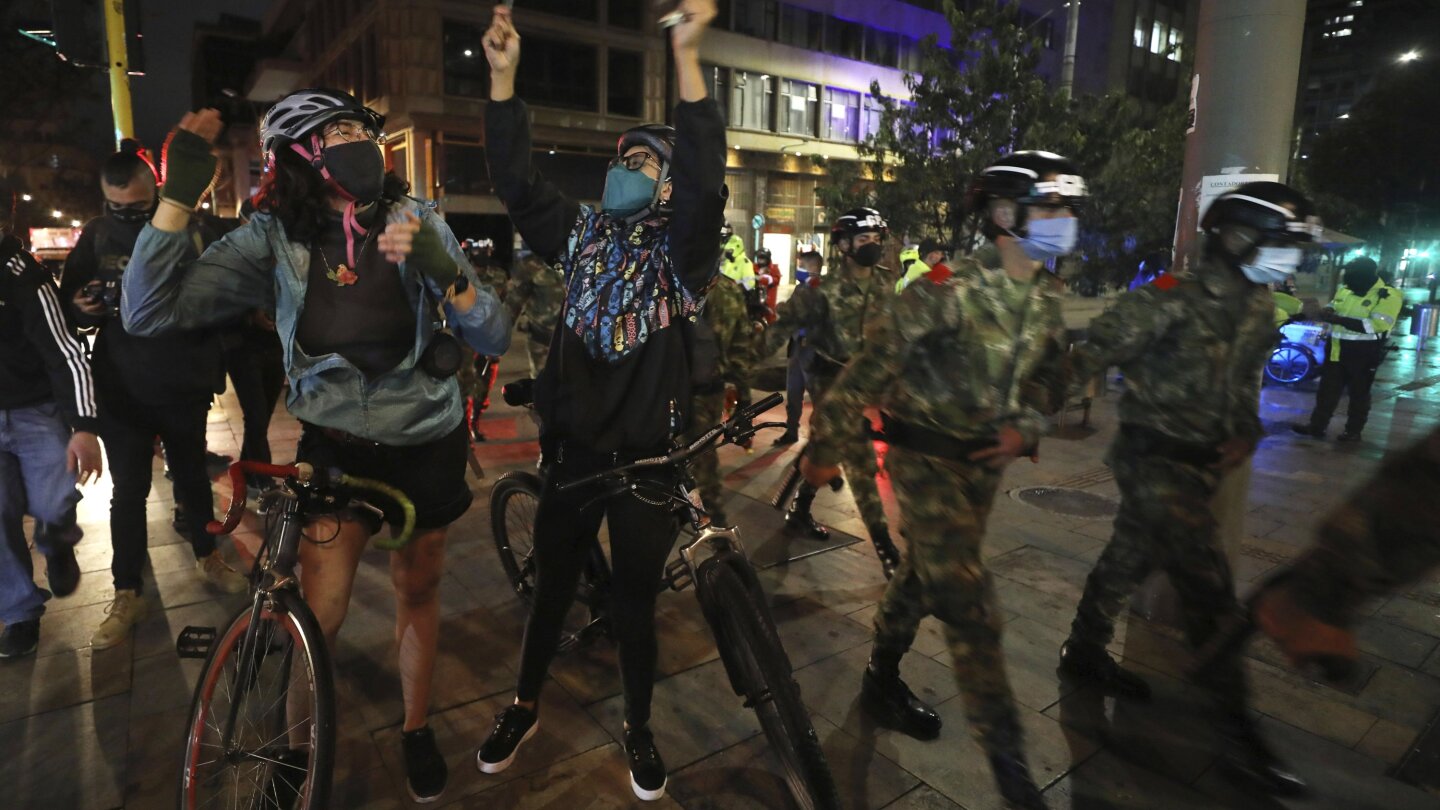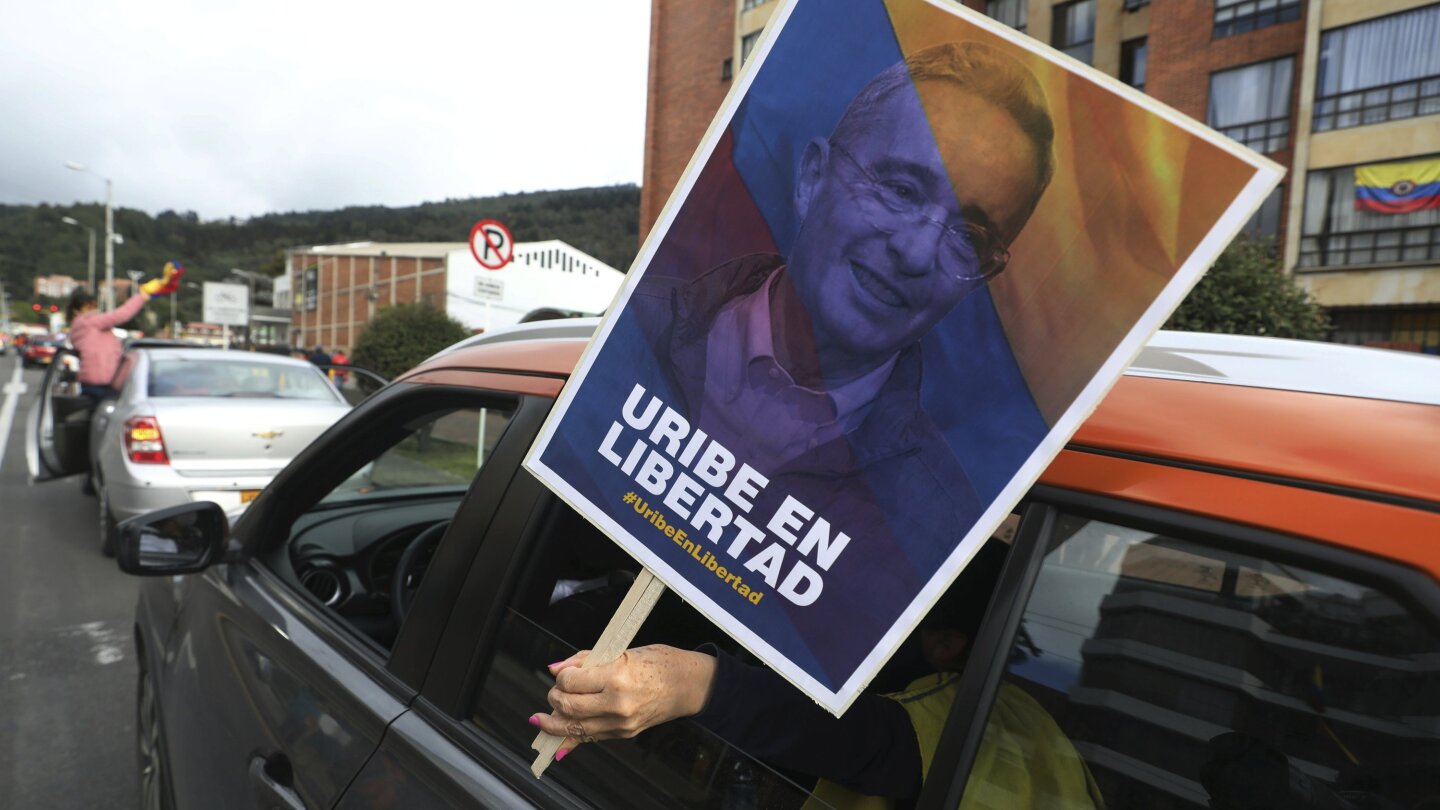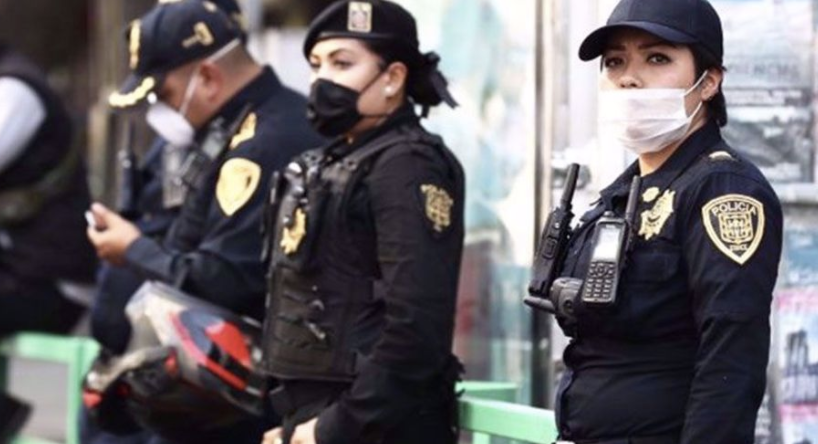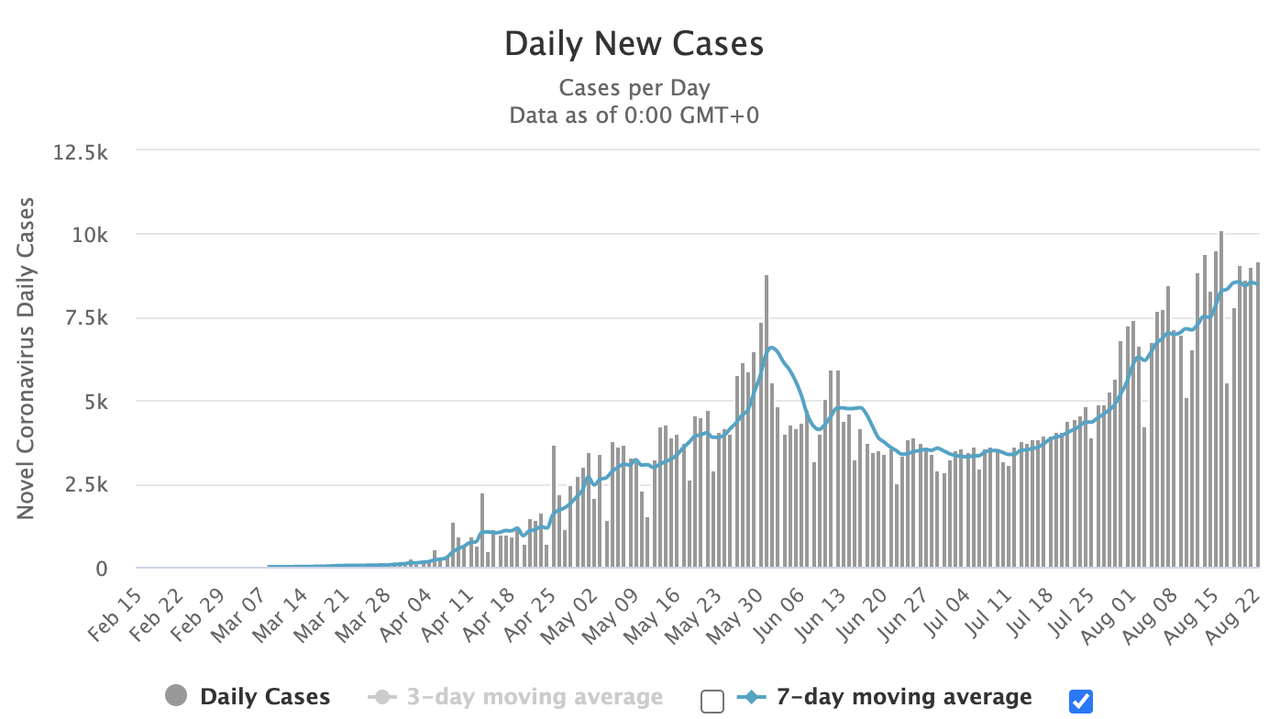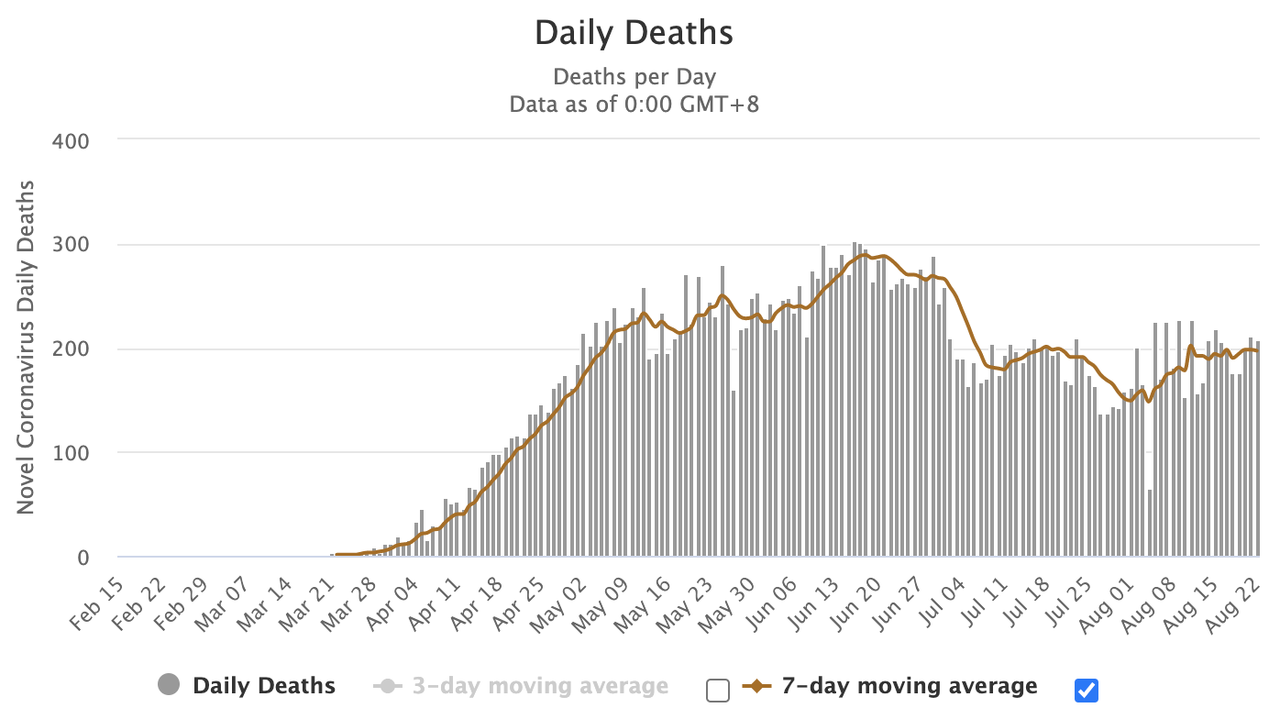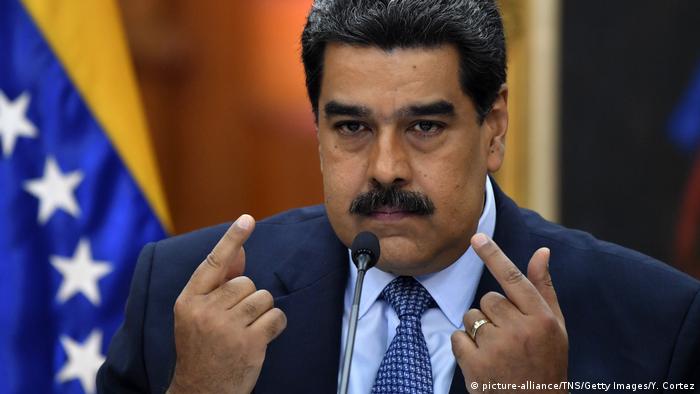Plain Jane
Just Plain Jane
Here is July's thread:
 www.timebomb2000.com
www.timebomb2000.com
Main Coronavirus Thread beginning page 1302:
 www.timebomb2000.com
www.timebomb2000.com

 apnews.com
apnews.com
Click to copy
First Bolsonaro trip since recovery aims at opponents’ votes
By RICARDO COLETTAyesterday

1 of 5
Brazil's first lady Michelle Bolsonaro looks at her husband, President President Jair Bolsonaro, while singing their national anthem during an event at the presidential palace in Brasilia, Brazil, Wednesday, July 29, 2020. The first lady tested positive for COVID-19, according to an official statement released Thursday, July 30. (AP Photo/Eraldo Peres)
BRASILIA, Brazil (AP) — Brazilian President Jair Bolsonaro on Thursday took his first trip since recovering from COVID-19, ignoring social distancing recommendations as he worked to chip away support in his political rivals’ stronghold.
Bolsonaro said he intended to travel Brazil after beating the disease, which kept him confined to the presidential residence for more than two weeks.
On Saturday, he announced that he had tested negative, and chose as his first destinations two small cities in Brazil’s northeast — the second-most populous region and the only one he lost in the 2018 presidential election. The impoverished region voted overwhelmingly for the leftist Workers’ Party.
The far-right leader flew to Piaui state where he was greeted by dozens of people crowding in front of the airport. Bolsonaro shook hands and at times even removed his face mask. Meanwhile, officials in the capital announced that Brazil’s first lady and a fifth member of Bolsonaro’s Cabinet tested positive for the new coronavirus.
Bolsonaro then flew to Bahia state to inaugurate a new public water supply system. Its construction began during a Workers’ Party administration, was concluded during Bolsonaro’s term, and was long-awaited in the area historically affected by severe droughts and scarce access to water. The president removed his mask at a fountain and splashed water on supporters and allies who gathered around him.
Bolsonaro has downplayed the virus’ severity, even after he was infected, arguing against restrictions on economic activity that he contends will prove far more damaging than the disease. His approach to the pandemic runs counter to most health experts’ prescriptions and is disapproved of by the majority of Brazilians, according to recent opinion polls.
Later in the day, Bolsonaro said in a live broadcast on his social media channels that he had taken a blood test after feeling “a little weakness” Wednesday. He added doctors found “some infection.” He was not wearing a mask.
After once more advertising chloroquine, an anti-malaria drug that is not scientifically approved for use to treat COVID-19, Bolsonaro added he is now taking antibiotics to fully recover.
“After 20 days inside the house we get other problems, right? I got some mold in my lung, maybe that’s it,” he said.
On Friday, he is scheduled to travel to Rio Grande do Sul state on the border with Uruguay.
In a speech during the water works event, Bolsonaro praised the northeastern region and said its residents should not view themselves as inferior to other Brazilians.
“You are like people from all the other four regions of Brazil. We are all equal, only one people, one race and one objective: to place Brazil above all,” he said. “And you are the ones who give us the energy to fulfill our goal.”
Advisers have counseled the president to intensify public appearances in northeastern Brazil to improve his standing, as emergency cash the federal government doled out during the pandemic has bolstered his image among the poor, three officials who declined to be named because they aren’t authorized to speak publicly told The Associated Press.
This trend in the northeast can already be identified in some opinion polls, said Antonio Lavareda, a sociologist and political science professor at the Federal University of Pernambuco, another northeastern state.
“In the northeast, people’s incomes are lower than the national average, so its residents are more susceptible to that (the benefit)” Lavareda said by phone.
The government’s $115 monthly pandemic welfare payment was initially planned to last until June, but Bolsonaro extended it by two months.
Payments have already cost the government more than $32 billion and Brazil’s economy minister, Paulo Guedes, has said its coffers can ill afford to maintain the program much longer. Bolsonaro this month also warned that it can’t persist indefinitely.
But the president’s political allies have started pressuring for another extension. The handout has reduced extreme poverty to its lowest level in decades, according to a study released this week by the Getulio Vargas Foundation, a university.
Experts warn that poverty will rise again after the last monthly payment, currently slated for August. Brazil will hold municipal elections in October.
Also on Thursday, Science and Technology Minister Marcos Pontes wrote on Twitter that he tested positive for the coronavirus after experiencing flu-like symptoms and headache. He said he was in isolation.
The presidency’s press office later said in a statement that the president’s wife, Michelle Bolsonaro, also tested positive and appears to be in good health. She joined her husband in the capital, Brasilia, on Wednesday when he participated in his first public event since recovering.
___
Associated Press writer Mauricio Savarese in Sao Paulo contributed to this report.
INTL - Latin America and the Islands: Politics, Economics, and Military- July 2020
June's thread: https://www.timebomb2000.com/xf/index.php?threads/latin-america-and-the-islands-politics-economics-military-june-2020.575292/#post-7846369 Main Coronavirus Thread beginning page 1264: https://www.timebomb2000.com/xf/index.php?threads/main-coronavirus-thread.566780/page-1264...
Main Coronavirus Thread beginning page 1302:
CORONA - Main Coronavirus thread
View: https://www.youtube.com/watch?v=BNH6vW2Yaf8 27:24 min 127 - Dr. Ruth Karron Answers Your COVID-19 Vaccine Questions •Jul 31, 2020 Johns Hopkins Bloomberg School of Public Health How close are we to a vaccine? What do efficacy trials actually entail? What are the challenges to...

First Bolsonaro trip since recovery aims at opponents' votes
BRASILIA, Brazil (AP) — Brazilian President Jair Bolsonaro on Thursday took his first trip since recovering from COVID-19, ignoring social distancing recommendations as he worked to chip away support in his political rivals’ stronghold.
Click to copy
First Bolsonaro trip since recovery aims at opponents’ votes
By RICARDO COLETTAyesterday

1 of 5
Brazil's first lady Michelle Bolsonaro looks at her husband, President President Jair Bolsonaro, while singing their national anthem during an event at the presidential palace in Brasilia, Brazil, Wednesday, July 29, 2020. The first lady tested positive for COVID-19, according to an official statement released Thursday, July 30. (AP Photo/Eraldo Peres)
BRASILIA, Brazil (AP) — Brazilian President Jair Bolsonaro on Thursday took his first trip since recovering from COVID-19, ignoring social distancing recommendations as he worked to chip away support in his political rivals’ stronghold.
Bolsonaro said he intended to travel Brazil after beating the disease, which kept him confined to the presidential residence for more than two weeks.
On Saturday, he announced that he had tested negative, and chose as his first destinations two small cities in Brazil’s northeast — the second-most populous region and the only one he lost in the 2018 presidential election. The impoverished region voted overwhelmingly for the leftist Workers’ Party.
The far-right leader flew to Piaui state where he was greeted by dozens of people crowding in front of the airport. Bolsonaro shook hands and at times even removed his face mask. Meanwhile, officials in the capital announced that Brazil’s first lady and a fifth member of Bolsonaro’s Cabinet tested positive for the new coronavirus.
Bolsonaro then flew to Bahia state to inaugurate a new public water supply system. Its construction began during a Workers’ Party administration, was concluded during Bolsonaro’s term, and was long-awaited in the area historically affected by severe droughts and scarce access to water. The president removed his mask at a fountain and splashed water on supporters and allies who gathered around him.
Bolsonaro has downplayed the virus’ severity, even after he was infected, arguing against restrictions on economic activity that he contends will prove far more damaging than the disease. His approach to the pandemic runs counter to most health experts’ prescriptions and is disapproved of by the majority of Brazilians, according to recent opinion polls.
Later in the day, Bolsonaro said in a live broadcast on his social media channels that he had taken a blood test after feeling “a little weakness” Wednesday. He added doctors found “some infection.” He was not wearing a mask.
After once more advertising chloroquine, an anti-malaria drug that is not scientifically approved for use to treat COVID-19, Bolsonaro added he is now taking antibiotics to fully recover.
“After 20 days inside the house we get other problems, right? I got some mold in my lung, maybe that’s it,” he said.
On Friday, he is scheduled to travel to Rio Grande do Sul state on the border with Uruguay.
In a speech during the water works event, Bolsonaro praised the northeastern region and said its residents should not view themselves as inferior to other Brazilians.
“You are like people from all the other four regions of Brazil. We are all equal, only one people, one race and one objective: to place Brazil above all,” he said. “And you are the ones who give us the energy to fulfill our goal.”
Advisers have counseled the president to intensify public appearances in northeastern Brazil to improve his standing, as emergency cash the federal government doled out during the pandemic has bolstered his image among the poor, three officials who declined to be named because they aren’t authorized to speak publicly told The Associated Press.
This trend in the northeast can already be identified in some opinion polls, said Antonio Lavareda, a sociologist and political science professor at the Federal University of Pernambuco, another northeastern state.
“In the northeast, people’s incomes are lower than the national average, so its residents are more susceptible to that (the benefit)” Lavareda said by phone.
The government’s $115 monthly pandemic welfare payment was initially planned to last until June, but Bolsonaro extended it by two months.
Payments have already cost the government more than $32 billion and Brazil’s economy minister, Paulo Guedes, has said its coffers can ill afford to maintain the program much longer. Bolsonaro this month also warned that it can’t persist indefinitely.
But the president’s political allies have started pressuring for another extension. The handout has reduced extreme poverty to its lowest level in decades, according to a study released this week by the Getulio Vargas Foundation, a university.
Experts warn that poverty will rise again after the last monthly payment, currently slated for August. Brazil will hold municipal elections in October.
Also on Thursday, Science and Technology Minister Marcos Pontes wrote on Twitter that he tested positive for the coronavirus after experiencing flu-like symptoms and headache. He said he was in isolation.
The presidency’s press office later said in a statement that the president’s wife, Michelle Bolsonaro, also tested positive and appears to be in good health. She joined her husband in the capital, Brasilia, on Wednesday when he participated in his first public event since recovering.
___
Associated Press writer Mauricio Savarese in Sao Paulo contributed to this report.


